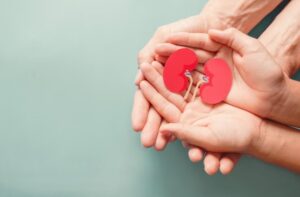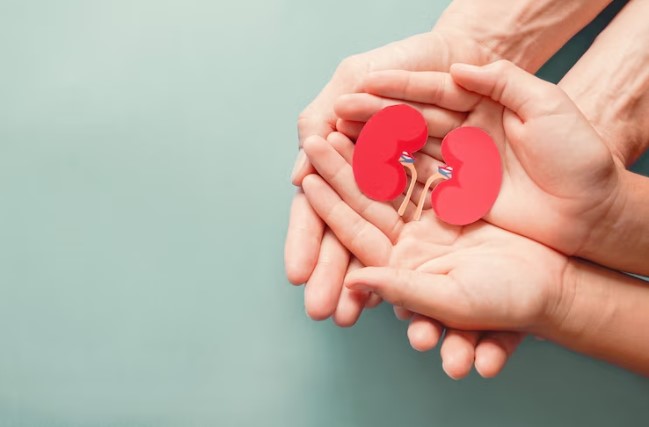Kidneys are two bean-shaped organs in our body each about the size of your fist. They are located just below your rib cage, one on each side of your spine. The main functions of your kidneys are filtering blood and removing waste and extra water from your body while producing urine. The proper functioning of your kidneys is essential to maintain the fluid and electrolyte balance of your body. Chronic kidney disease can be defined as any abnormality of the kidneys, that last for more than three months duration. It is a descriptive term used to describe the deterioration of kidney function which can be reversible or not due to many underlying pathologies.
Epidemiology
According to recent studies, it was identified that around 1 in 10 of the population may have chronic kidney disease, while it is less common among young adults. But it is prevalent about in 50% of the elderly population over 75 years of age.
Causes for Chronic Kidney Disease
- Type one or type two diabetes mellitus.
- High blood pressure.
- Normal aging of kidneys.
- Inflammation of the filtering units of the kidneys, called Glomerulonephritis.
- Inflammation of the tubules and surrounding structures of the kidneys, called Interstitial Nephritis.
- Polycystic kidney disease.
- Prolonged obstruction of the urinary tract due to an Enlarged prostate gland, Renal stones, or some Renal cell carcinomas.
- Conditions that cause reflux of urine back to the kidneys from the lower parts of the urinary tract which is called Vesicoureteral Reflux.
- Getting recurrent kidney infections without being treated properly which is called Pyelonephritis.
Risk Factors of Chronic Kidney Disease

- Medical comorbidities such as diabetes, high blood pressure, and heart diseases.
- Smoking.
- Increased alcohol consumption.
- Increased BMI for age and obesity.
- Having relatives in the family who have had kidney diseases previously.
- Older age, being over 65 years.
- Use of medications that can damage the kidneys.
- Structural abnormalities of kidneys that might have been there unrecognized and untreated since birth.
Clinical Features
Clinical features of chronic kidney disease occur only when it lasts for a long period and gets progressed. Also, as most of these features are non-specific, they can get ignored. Hence you need to identify if you are having similar symptoms as below and get yourselves consulted by a medical doctor.
- Nausea and vomiting.
- Swelling of dependent parts of the body including feet, ankle, and sacra spinal area.
- Distension of the abdomen due to accumulation of fluid.
- Loss of appetite.
- Sleeping abnormalities.
- Abnormalities in urination which can be increased urination or reduced urination.
- Decreased ability to concentrate.
- Shortness of breath, especially when in a lying down position or when you are sleeping you can get awakened due to lack of air for breathing.
- Chest pain.
- Muscle cramps.
Complications
- Swelling of your arms and legs, increased bold pressure, accumulation of fluid in lungs or around the heart due to reduced filtration of fluid from your body.
- Chronic kidney disease is a major risk factor for cardiovascular diseases such as sudden cardiac death, myocardial infarction, cardiac failure, strokes, and peripheral vascular diseases.
- Inflammation of the sac situated around the heart covering it which is also called Pericarditis.
- Skin conditions such as itching, dry skin, and skin rashes.
- Gastrointestinal complications an increased risk of getting GORD, Gastrointestinal bleeding, Acute Pancreatitis, and Gastritis.
- Abnormalities in lipid metabolism including reduced clearance of triglycerides and increased cholesterol concentrations in the blood can lead to lipid disorders.
- A resistance to insulin can develop in your body which can make you predisposed to get diabetes.
- Menstrual irregularities can occur in women.
- In children and impairment in growth can occur due to abnormalities of hormones related to growth.
- Accumulation of toxic products in the body such as uric acid can result in diseases such as gout.
- Decreased physical fitness and muscle dysfunction.
- Impaired filtration of electrolytes from your body can lead to the accumulation of toxic electrolytes such as potassium which can lead to sudden cardiac arrest and death.
- Reduced concentration of hemoglobin in blood which can cause shortness of breath and fatiguability.
- Due to impaired calcium metabolism, bones might get weak and get predisposed to get fractures which are also known as CKD mineral and bone disease.
- Impairment of your immune system can make you predisposed to get infections.
- Reduced libido which can lead to erectile dysfunction, subfertility, and psychosocial stress.
- Reduced functioning of your central nervous system can lead to difficulties in concentration and personality changes.
Staging of Chronic Kidney Disease
According to KDIGO classification, chronic kidney disease can be classified into five stages, in which the later stages are considered more serious and life-threatening.
KDIGO classification system of CKD.
Diagnosis of Chronic Kidney Disease
- Initially, your doctor will ask you several questions regarding the history of your presentation. Then you will be clinically examined for signs and symptoms which are suggestive of chronic kidney disease. Then you will be recommended to get done some specific investigations to reach the diagnosis and initiate the treatments.
- A blood test will be done to analyze the amount of creatinine concentration in the body, a toxic product normally filtered by the kidney that can get increased due to reduced functioning of the kidneys.
- A calculation known as estimated glomerular filtration rate (eGFR) will be made by your doctor using the creatinine levels of your blood, your age, your size, your gender, and your ethnicity. This is the main calculation used to identify the progression and staging of your kidney disease.
- Your urine will also be analyzed for albumin and creatinine concentrations. Also, will look for the presence of blood cells and protein in the urine.
- Imaging studies such as ultrasound scanning, magnetic resonance imaging (MRI), and computed tomography (CT) will be used to identify any structural abnormalities of kidneys or any obstructions in the urinary tract.
- Samples can be taken from your kidney which is called biopsies to examine them under microscopy for signs of damage.
Treatment for Chronic Kidney Disease
The treatment you receive will differ according to which stage you are in the staging of CKD. If you are in the later stages, you will need Renal Transplantation or Renal Replacement therapy which is done through hemodialysis or peritoneal dialysis.
If you are in the early stages, you will be managed conservatively to reduce symptoms and avoid getting complications.

Life Style Modifications
Medical management for CKD is a complex procedure that varies according to which stage you are in and which complications you are having. But steps you can take to protect your kidneys through changes in your health habits don’t vary according to which stage you are in.
- You must control your blood pressure, glucose levels and not miss regular check-ups and appointments you have with medical doctors.
- You must have good compliance with drugs and engage in regular monitoring of your renal function without missing.
- Patient can get a consultation from a dietician and develop a healthy diet plan which is suitable for you.
- You must engage in regular exercises and maintain a healthy BMI level for your age.
- You must avoid the consumption of alcohol and any tobacco products which can be extremely harmful to your kidneys.
- Always get a good sleep and find creative ways to deal with daily stress.
- You can make a timetable and schedule your work while leaving some time of the day for you to relax and engage in leisure activities.
- As some painkillers and counter drugs, we take can cause damage to the kidneys it is important to avoid taking any medications without the advice of your family doctor.
- Drink at least about 2 liters of fluid unless you are in the final stages of kidney disease.
- Get all the relevant vaccines on time to keep yourselves protected from getting infections such as influenza and pneumonia due to impairment of your immune system which can be caused due to kidney disease.
References
- Bailey and Love’s Short Practice of Surgery- 27th Edition
- Kumar and Clerk’s Clinical Medicine -8th Edition- Parveen Kumar, Michael Clark
- Oxford Handbook of Clinical Medicine – 10th Edition
- Browse’s Introduction to the Symptoms and Signs of Surgical Disease – 4th Edition – Norman L. Browse, John Black, Kevin G. Burnand and William E.G. Thomas

